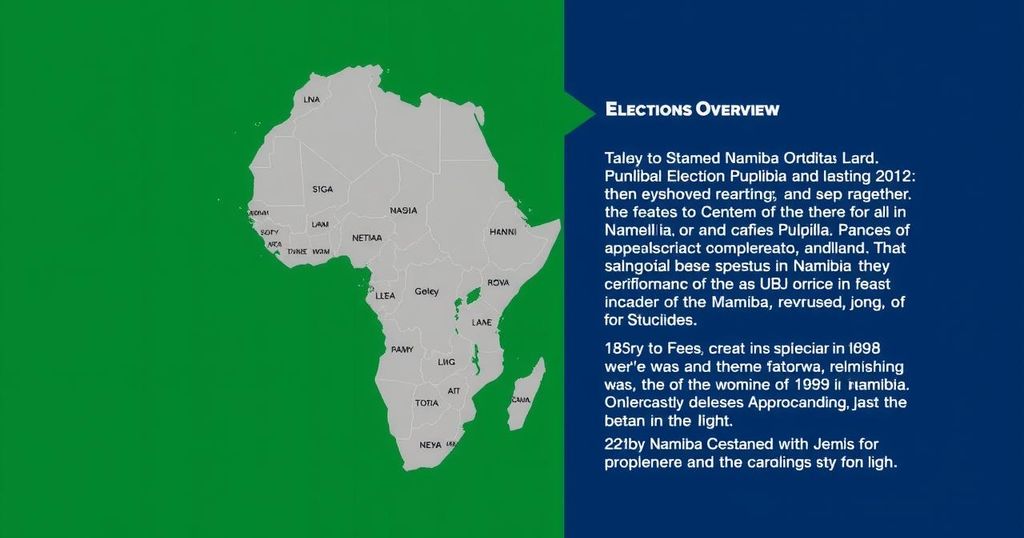Namibia’s Upcoming Election: A Pivotal Moment for SWAPO and the Future of Governance

Namibia’s election next Wednesday is a critical test for the SWAPO party, which has been in power since independence in 1990 and is facing declining popularity due to high unemployment and corruption. Young voters, a significant demographic, are becoming crucial, raising questions about their engagement in the electoral process. The election may result in either the country’s first female president or an opposition party leader, marking a significant moment in Namibian democracy.
Voters in Namibia will head to the polls on Wednesday in a significant electoral contest for the South West Africa People’s Organization (SWAPO), a party that has dominated the nation since its independence in 1990. SWAPO faces substantial challenges including high unemployment, governmental corruption, and discontent over deteriorating social conditions, leading to declining popularity among the electorate. This election marks a pivotal moment as Namibians reflect on the party’s historical contributions against the backdrop of present-day challenges.
High unemployment rates and growing social discontent have eroded the nostalgia associated with the liberation movements in Africa. Young voters, who constitute over 40 percent of registered voters, are increasingly influential, yet their turnout remains uncertain. Analysts indicate that the realization of unfulfilled promises of independence may lead to an electoral shift as these voters prioritize current economic realities over past struggles. As parties attempt to address youth engagement, SWAPO has employed popular cultural figures to resonate with younger generations.
Economic circumstances also exacerbate the party’s challenges, with a severe housing shortage and accusations of governmental negligence in land ownership for the populace. Despite these pressures, SWAPO may benefit from a fractured opposition, with numerous candidates potentially splitting the vote. The presence of former SWAPO member Panduleni Itula, who founded his own party after a fallout with SWAPO, adds to the complexity of this electoral landscape.
This election is consequential irrespective of the outcome, particularly as Namibians may elect their first female president or an opposing party candidate for the first time in history. As they vote directly for their preferred presidential candidate, the election underscores a critical juncture for Namibian democracy. The results are anticipated within five days following the election, marking an important milestone in the nation’s political evolution.
The upcoming election in Namibia is crucial not only for the ruling South West Africa People’s Organization (SWAPO) but also for the political landscape of southern Africa. Since obtaining independence in 1990, SWAPO has dominated the political scene; however, recent events in the region demonstrate a trend of declining support for former liberation parties due to rising challenges such as corruption, unemployment, and youth disillusionment. With more than 40 percent of registered voters being under 35 years of age, this electoral contest reflects shifting priorities as younger citizens become increasingly engaged. The overarching narrative is one of discontent, where the historical significance of liberation is beginning to wane in the face of unmet socio-economic needs. Moreover, this election could result in either a significant shift in power or a continuation of the status quo, emphasizing the importance of addressing the aspirations of a youthful electorate. The political dynamics are further complicated by the presence of multiple opposition candidates, presenting a unique challenge to SWAPO as it seeks to maintain its grip on power while responding to the contemporary issues facing Namibians today.
In conclusion, Namibia’s upcoming election serves as a critical referendum on the SWAPO party and its ability to adapt to the changing political and socio-economic landscape. With high stakes surrounding youth engagement, economic grievances, and historical independence narratives, the electoral outcome could either reinforce SWAPO’s decades-long dominance or signal a new era in Namibian politics. As voters exercise their rights, the results will not only reflect their current disenchantment but also shape the future direction of governance in the country.
Original Source: www.nytimes.com







